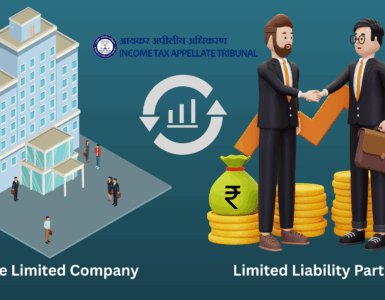On 7th of September, the NCLT Mumbai bench, rejected the scheme of amalgamation and arrangement between Gabs Investments Pvt Ltd (Gabs) – the TRANSFEROR Company and Ajanta Pharma Ltd (Ajanta Pharma) – the TRANSFEREE Company and their respective shareholders on the grounds of General Anti Avoidance Rules (GAAR).
Facts and background
- Gabs Investment is a private limited investment company and Ajanta Pharma is a listed, pharmaceutical company.
- While the entire shareholding of Gabs Investments is held by Agrawal Family Members (Promoters), both Gabs Investments and Agrawal Family Members are shareholders and promoters of Ajanta Pharma.
- In the present Scheme, Gabs Investments was proposed to be merged into Ajanta Pharma, with shares to be allotted to the shareholders of Gabs Investments.
- Gabs Investment Pvt Ltd(Gabs) is the group holding company and primarily holds 9.53% stake in Transferee company. Consequently, the shareholding of Gabs Investments in Ajanta Pharma would have been cancelled.
- Pre and Post amalgamation, the promoters of Gabs would continue to hold the same percentage of shares in Ajanta. Effectively, pursuant to the proposed Scheme, individual Promoters would have received proportionate shares in Ajanta Pharma.
- The financial position of Ajanta will remain same post-merger.
The income tax department after considering the facts, the family tree of Agarwal Family, background of the scheme, salient features of the scheme, consideration payable, accounting treatments in the books of Ajanta Pharma as per the scheme, financials of Gabs, financial implication of the scheme, has made the following observations:
- As on 31st July 2017, 61.17% of shares of Ajanta Pharma are held by Agrawal Family Members. The Shareholding of Gabs is controlled by Agrawal Family Members only.
- Gabs being a private limited company has to be considered as a separate entity and any “assets” of the Pvt Ltd company cannot be transferred and distributed directly without tax implications. The company has to pay the Dividend Distribution Tax (DDT) @ 20% and accordingly the DDT will be Rs 134.16 Crores. This DDT of Rs 134.16 Crores will be lost if this amalgamation scheme is approved.
- The total cost of acquisition of shares of Ajanta by Gabs is Rs 48.73 Crores. As per MOA of Gabs, the investment and dealing in equity shares is the business of the company and once the equity is sold in the market the business profit will be acquired by Gabs and the amount will be Rs 958.34 Crores (Rs 1007.07 Crores – Rs 48.73 Crores). On this business profit tax @30% is payable and accordingly an income tax liability of Rs 287.50 Crores will arise to the company. Further, in case the applicability of MAT u/s 115JB @20% should be kept in mind, in case the Gabs adopts another method of computation of income. This tax of Rs 287.50 Crores will be lost if this amalgamation scheme is approved by NCLT Mumbai.
- Therefore, there will be a total loss of Rs 421.66 Crores to the revenue, if this amalgamation scheme is approved.
- The Scheme was a deliberate measure to avoid a tax burden by using the via-media of NCLT, and that it was nothing but round-trip financing, which included a transfer of funds among the parties to the arrangements through a series of transactions. In view of the GAAR, the Scheme should be construed as an Impermissible Avoidance Agreement (IAA) and, thus, should not be allowed by the NCLT.There will be a total loss of Rs 421.66 Crores to the revenue, if this amalgamation scheme is approved by NCLT.
NCLT Rulings
With an investment of INR 48.7 Crores, promoters would get shares worth INR 1,477 Crores (market value as on 31.3.2017) without payment of income tax.
Please note:
- The 700 shares issued by the transferor company (Gabs) on 18.03.2017 i.e. after the cut off/appointed date of 1st April 2016 the treatment for the same has not been explained in the scheme/petition.
- Hence with due respect to the NCLT’s decision, its view that these 700 shares will not get any shares from the transferee company (Ajanta Pharma) and it may continue to remain with the shareholders of Gabs even after Winding up/dissolution of Gabs is irrational.
- The valuation report from the independent valuer is total number of shares to be issued by the transferee company for total number of shares of the Transferor Company and has not arrived at swap ratio or value per share of both the companies. Hence it cannot be observed that valuation of these 700 shares were not considered by the valuer.
Various judgements that the petitioner companies (Gabs and Ajanta Pharma) relied upon to defend the argument
| Case laws | Rationale for Judgements |
| Company petition No 215/1978 between A.W. Figgis & Co Pvt Ltd decided by the High Court of Calcutta on 31st July 1978 | “It is a well-accepted principle of law that an assessee can so arrange his affairs as to minimise his tax burden. Hence, if the assessee, in this case, has arranged its affairs in such a manner as to reduce its tax liability by starting a subsidiary company and transferring its shares to that subsidiary company and thus forgoing part of its own profits and at the same time enabling its subsidiary to earn some profits such a course is not impermissible under law.”
Therefore, it is quite clear from the well-settled principle laid down by the Supreme Court that by lawfully arranging matters, nobody can be held guilty of any evasion of provisions of law even if it may avoid certain incidence of tax or duties. |
| Mihir H Mafatlal V/s Mafatlal Industries Ltd (AIR 1997 SC 506) | The court has neither the expertise nor the jurisdiction to delve deep into the commercial wisdom |
| Azadi Bachao Andolan decided by Supreme Court in the year October 2003 | The court finds that notwithstanding a series of legal steps taken by an assessee, the intended legal result has not been achieved, the court might be justified in overlooking the intermediate steps, but it would not be permissible for the court to treat the intervening legal steps as non-est based on some hypothetical assessment of the ‘real motive’ of the assessee. |
| Unichem Laboratories (AVM Capital Services Pvt Ltd) decided by the High Court at Bombay July 2012 | The implementation of a transaction under one of the alternative options available, which does not lead to any tax outflow, is not illegal or unlawful, the high court has further held that such a transaction is permissible provided it is within the framework of the law. |
We note that in Gabs case the NCLT Mumbai relied on the case of Wiki Kids Limited, in which the NCLAT had given the following decision:
- The NCLAT pointed out the disclaimer in the valuation report issued by the independent chartered accountant, which stated that the entire valuation, provided in the report, was based on the documents provided by the management of the Appellants and the valuer had disclaimed the accuracy and reliability of such information. Thus, the NCLAT held that shareholders could not be said to have been conveyed sufficient assurance, merely by placing reliance on such a valuation report.
- The NCLAT held that a scheme should be fair and in the interest of all shareholders and not only for a few among them. The NCLAT clarified further that the constitution of the NCLT comprises of both judicial and technical members.
- Thus, it has enough expertise to examine a scheme and to ensure that it is fair and just to all shareholders. The NCLAT agreed that it may not be desirable for the NCLT to look into mathematical details. However, if, from a broad review of the scheme, it appears to be unfairly beneficial to a particular class of persons, then it should exercise the expertise available to it and refuse to approve a scheme if, according to its opinion, it fails to uphold the public interest.
- In the context of the instant case, the NCLAT held that without going into deep mathematical details, it was apparent that the benefit to the accord of |INR 12 crores was flowing into the hands of the common promoters of the Appellants even though the net worth of the Transferor Company was only INR 22 lakhs. Accordingly, the NCLAT held that the Scheme was not beneficial to shareholders at large and upheld the decision of the NCLT.
- Notably, the NCLAT distinguished the Supreme Court rulings in Hindustan Lever Employees’ Union (supra) and Miheer H Mafatlal (supra) on the basis of facts and rejected the reliance placed on them by the Appellants.
Conclusion
The Scheme would have benefited only promoters and not to the company or public shareholders. Not only no public interest is envisaged to be served but it will avoid or reduce income tax liability of the promoters. Therefore, the scheme stands rejected.




